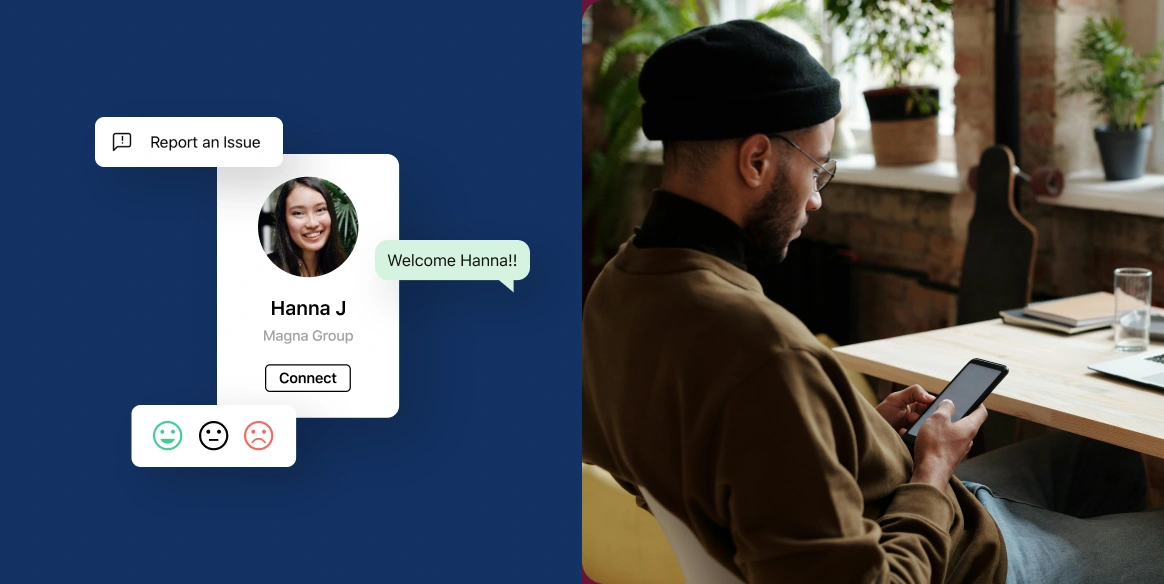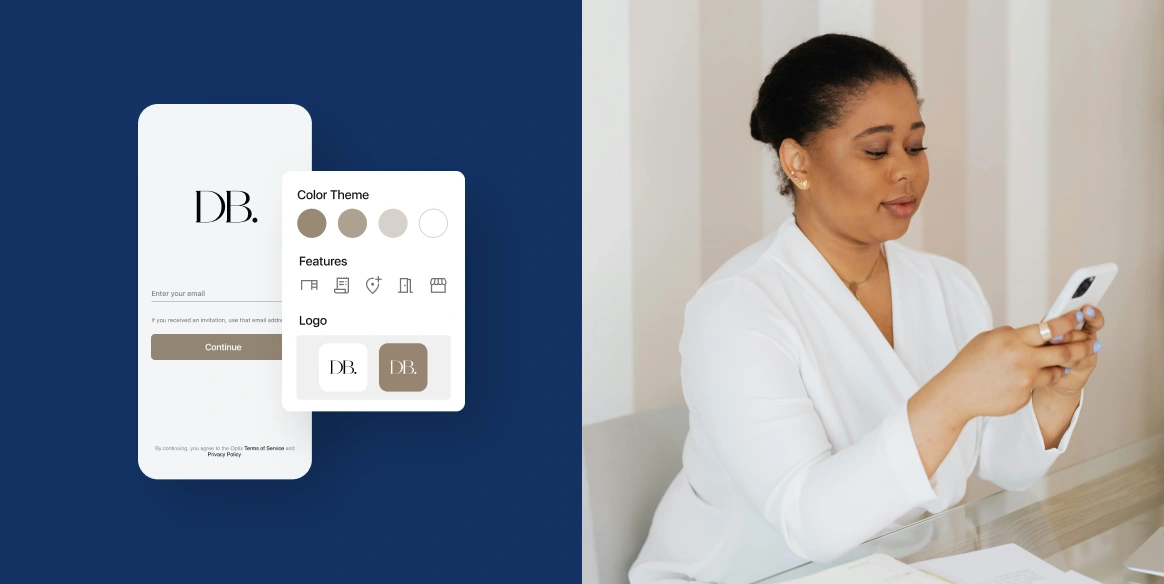- What is a white-labeled app for coworking spaces?
- How much does a coworking white-labeled app cost?
- What are the features of a white-labeled app for coworking spaces?
- The benefits of having a white-labeled app in your coworking space
- Do I still need an app if my online coworking bookings are mobile-optimized?
- How can I customize a white-labeled app?
- Should you build an app yourself from scratch?
- What does the white-labeled app process look like?
- Get a white-labeled app for your coworking space with Optix
Part of being a top-tier coworking space operator is providing your members with an unforgettable and undeniably unique user experience.
That means investing in hospitality, going the extra mile whenever you can, and equipping yourself with the technology required to create a seamless experience for your members.
This is why white-labeled apps are so popular in the coworking industry – they give you the power to create a branded, technology-forward experience while putting the user front and center.
Today we’re making the case that every flexible workspace needs a white-labeled app. But first, let’s start with the basics.
What is a white-labeled app for coworking spaces?
A white-labeled app is a mobile application for iOS and/or Android that is built by a third party, but operates under your brand. It is used by coworking spaces to manage bookings, payments, messaging, and more.
Let’s say you operate a multi-location coworking space, and you want to make it easy for members to make bookings on-the-go. You need a mobile app, but you don’t have the resources to develop your own, a lengthy process that could take months and cost you thousands of dollars.
With a white-labeled app, you can pay a third party to develop and manage your app for you. That means, you get a fully functional, tried and tested app at a fraction of the price.
The best part is, it makes no difference to your members. It shows up in the Apple App Store or Google Play Store as your app under your brand name. To your members, the app is 100% yours.
How much does a coworking white-labeled app cost?
The cost of a white-labeled app depends on the platform you decide to work with. Most white-labeled apps will cost anywhere between $100 to $250 a month. The monthly fee covers the ongoing maintenance and bug fixes required to maintain the app.
At Optix, we price our services based on the size of your organization, with a white-labeled app starting at $99 a month. That includes the cost to develop and maintain it including releasing new features, updating it with new functionality regularly, etc.
What are the features of a white-labeled app for coworking spaces?
White-labeled apps serve as a one-stop shop for anything your members need to do in and around your coworking space. This includes:
- Room bookings and resource bookings (think booking podcast rooms, desks, phone booths, etc.)
- Purchasing membership plans
- Making one-time or recurring payments
- Messaging other members
- Seeing events
- Checking in
- Purchasing products
- Submitting feedback requests
All of the features of a white-labeled app are typically customizable. You can create your own resources, set your own prices, create your own membership plans, the list goes on.
Whatever a member needs to do in your space, it can be done with a white-labeled app.
The benefits of having a white-labeled app in your coworking space
Coworking businesses and flexible workspaces gain several advantages by using a white-labeled app in their community.
1. You can launch a better app at a faster rate
Build vs. buy is an age-old problem in business. Most people don’t realize just how long it takes to create a custom app from scratch, from the architecture and design to the building and testing. For many coworking spaces, this process could take several months and thousands of dollars.
A quality app that has been tested, iterated upon, and used in real-world applications is the most reliable way to get a mobile application up and running fast.
While a custom solution may seem to be the best alternative in the beginning, you may quickly find that the effort derails internal business processes and busts budgets.
2. Your brand is front and center
When you implement a white-labeled app to help you run your coworking space, everything is branded as your own. This includes:
- Your app icon
- Your organization name
- The name and logo that appears in the app store
- UI including colors, buttons, and iconography
Now every interaction with your brand has cohesion and recognition, reinforcing your coworking space in the mind of your members. It also supports the professional look and feel of your business, an important component if you’re hoping to attract more corporate clients to your coworking space.
3. Your coworking members can do everything on the fly
Your members need to be able to do anything from anywhere. This is especially true if you’re looking to attract remote workers, as they require flexibility and agility when it comes to making bookings and payments.
A white-labeled app enables users to access everything they need to for your coworking space, no matter where they are.
4. Mobile app maintenance is a breeze
A custom app solution may be tempting, but building out your own app solution comes with the promise of tech debt.
Large organizations with robust development teams may be able to handle the continuous work that comes with owning a custom app. However, this is only worth it when specific needs can’t be met by any other means.
When you choose a white-labeled app, your digital space is always up to date, well maintained, and monitored for bugs and new features.
Licensing often includes the cost of support, user testing, and data-based iteration.
Paulo Cazarotto, Head of Engineering at Optix, has overseen the build of the white-labeled app experience for over three years. In his view, there are very few use cases that could justify the maintenance of a custom app.
Maintaining a mobile app is a time-consuming task. Every time you push a fix or new feature, you have to catch up with all of app store requirements — and these requirements change all the time. Unless you have a permanent team working on your app, it’s impossible to ensure it will work perfectly for all your customers.
5. You’ll save costs long-term
It’s easy to underestimate the costs associated with developing, implementing, and maintaining a custom app. With a custom app, you’ll need to:
- Launch new features
- Iterate on key product offerings
- Fix bugs
- Strategically improve your app experience
This is multiple full-time jobs for tech companies. When it comes to customer-facing apps, a white-label solution is almost always more affordable than developing a custom app.
White label apps are simply cheaper than hiring good professionals and keeping them a part of the company to provide ongoing support for the app. A white label solution is much more cost-effective and beneficial for your business.
Do I still need an app if my online coworking bookings are mobile-optimized?
A well-optimized mobile webpage is great to have, especially when it comes to SEO. However, having a dedicated app solution is almost always better for user engagement.
Mobile apps increase engagement with your coworking space, as we’ve seen time and time again through our work with hundreds of coworking space owners and operators. It’s the reason why we sunsetted the Optix web application several years ago.
How can I customize a white-labeled app?
All white-labeled apps have a degree of customizability built into them, from the colors to the iconography. However, you can take this customization one step further with what’s known as a developer platform.
Developer platforms, like the one in Optix, are a simple way for users to customize their app to fit their own needs. Think of it as building a 10-20% layer of custom functionality that is unique to your business on top of a pre-existing platform instead of having to build an operating system from scratch.
The developer platform enables you to not only build custom apps and integrations, but also add UI to the admin dashboard, as well as UI, buttons, etc. to the user apps.
This is an easier and much more cost effective solution than building something from scratch on your own.
Should you build an app yourself from scratch?
The truth is, a real need for a completely custom space booking app in the coworking industry is rare. Developers of white-label solutions try to account for a variety of use cases and users in their design. Flexibility and the ability to customize are baked into the product, leaving little to be desired for most space operators.
For most, a white-labeled app is simply a better choice. However, in some cases, building an app from scratch will be the best choice. This is either because you have very unique needs as a business (an “edge case”) or because you have outgrown all solutions on the market.
What does the white-labeled app process look like?
The white-labeled app process is simple, though it can take some time. This is largely due to circumstances outside of your or the third-party’s control as much of the onus is on Google and Apple. Here is a basic outline of the white-labeled app process.
- Create an Apple Developer Organization account: every organization with a white-labeled app will need to have an Apple Developer account. This is required by Apple to have your app in their app stores
- Design your white-labeled app: you’ll go through the process of designing your white-labeled app including your font, colors, and iconography. Once submitted to the third-party team, expect anywhere from 2-4 weeks to complete the app
- Add content to your app: once the app is built, it’s your turn to add content to it. This includes the resources to book, membership plans, upcoming events, and more
If you are interested in a white-labeled app, the best thing you can do is create your Apple Developer agreement as soon as you can, as this is the step that typically causes delays due to Apple’s processes.
Interested in a white-labeled app with Optix? Check out this FAQ that walks you through the process.
Get a white-labeled app for your coworking space with Optix
Here at Optix, we’re pioneers in mobile apps for coworking spaces. We were the first to bring mobile apps to coworking, and we’re known for having the best white-labeled app in the industry.
Our white-labeled apps are beautifully designed, easy to use, and reliable for you and your team. In the words of many of our clients, they feel very “Apple”.
Want to see if our white-labeled app would be a good fit for your coworking space? Book a call with a member of our team today!







